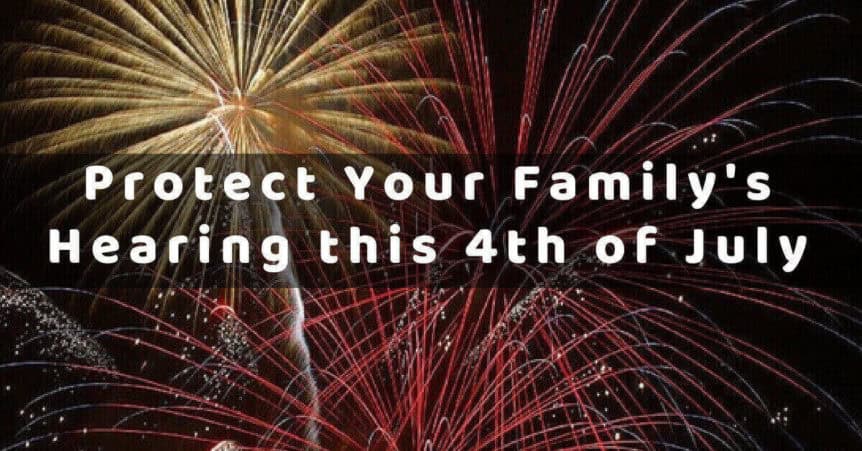- A Closer Look at Common Myths About Hearing Loss - May 7, 2024
- The Impact of Pets on Emotional and Hearing Health - April 26, 2024
- Strategies for Coping with Single-Sided Deafness - April 16, 2024
The 4th of July is a great holiday. Patriotism, picnics, parades and fireworks displays that are bigger, longer and – louder than ever. We like a celebration just as much as the next person, but the 4th of July is the noisiest holiday as well as the one most likely to damage your hearing. New Leaf Hearing Clinic says – celebrate with family and friends, but also take care of your hearing when it comes to the fireworks displays. Here are some safety tips to help you enjoy the aerial extravaganzas but keep your ears safe.
Fireworks are loud
Although some hearing loss is progressive over time, hearing loss can also be caused by a loud instantaneous noise – like an explosion, gunshot or fireworks. Noise is rated at decibels. The sound of exploding fireworks can reach 155 decibels or higher. And some of the firecrackers like the M80s or M100s are at a decibel rating considered to be dangerous. Let’s compare the 155-decibel rating with some other sounds to give a littler perspective. A jackhammer is 130 decibels, a jet plane on take off is 120 and a chainsaw is 100 decibels. Sounds louder than 85 decibels can cause permanent hearing loss. Long or repeated exposure to sounds at or above 85 decibels – like the sound of a snowblower or bulldozer – can cause hearing loss.
Stay back
Keep some distance from the fireworks display. You want to see them, you don’t need to be right on top of the boom to enjoy them. The closer you are to a noise source, the bigger the risk for immediate, sudden and permanent hearing loss. Stay at least 50 to 65 feet away from fireworks, firecrackers, and speaker systems broadcasting the fireworks noise or loud music. That would be about the length of a city bus. If it’s a concert and fireworks, seated in the middle rather than on the side where the music comes in a wave from the speakers, is best.
Kids should be 165 to 200 feet away from the noise – that would be about half the length of a football field. The auditory systems of children and teens are not fully developed. They are more susceptible to harm from loud noise.
Children under the age of 12 months should not be exposed to fireworks. If your child, whatever his or her age, claps their hands over their ears during the fireworks, it is too loud for them and causing them auditory distress. Children and babies cry at the fireworks not because of the lights, but because the sound hurts them.
Use ear protection
Fireworks are a visual experience, wearing ear plugs or ear muffs means you can enjoy the spectacle, and prevent hearing loss.
Ear plugs should fit snuggly in the ear and they can be purchased almost anywhere these days. Here’s a pro tip – roll them between your fingers before you insert them, and they will expand to fit your ear canal better.
They don’t keep all the sound out – but they will protect you from the damaging loud sounds. They are an easy and inexpensive way to protect your hearing during loud events.
Ear muffs will work, too. Not the kind you use when you are running the snowblower, but the ones they use as protection at loud events. And that’s a terrific way to sell them as an idea for the kids. Drivers at monster truck rallies wear them NASCAR team members wear them – airport ground crew workers wear them. Those are some cool jobs and role models.
The ear muffs have soft, padded ear cuffs and slim head bands. The ear cuffs are constructed so you have air circulating around your ears. There are even foldable ones for easy storage and carrying. They also come in fashion colors to appeal to kids of all ages and, ear plugs come in fashion colors, too!
Pay attention to the “toos”
Avoid noise that is “too loud” “too long” or “too close.” If you notice a ringing or buzzing in your ears, move away from noise source. There are environmental conditions that can make sounds louder even if you move away, so think about your surroundings. Fireworks can sound louder if the sound bounces off buildings.
Seek professional help
Have you noticed changes in your hearing? Are you concerned about exposure to loud noise? If so, get a hearing evaluation with us at New Leaf Hearing Clinic. If ringing or buzzing in your ears after you see a fireworks display goes on longer than a day or if you have tinnitus, contact us to schedule a consultation.

